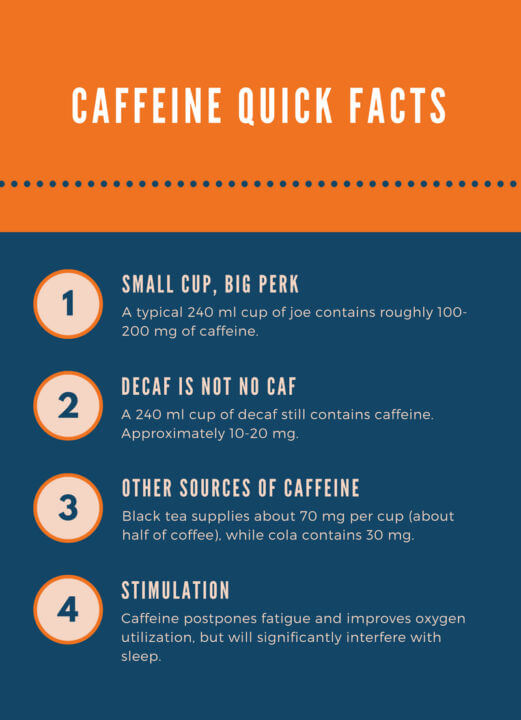North America runs on coffee! And so do many students. But what does coffee, tea, and the caffeine they contain actually do to the body?
Many research studies have investigated the effects of coffee and tea—and the caffeine they deliver—on the body. What is most remarkable about this research is the overall conclusion: tens of millions of people drink coffee and tea on a daily basis yet evidence of harm is almost non-existent.
A major reason people drink coffee is to experience the stimulating effect of caffeine. A typical 240-millilitre cup of coffee contains roughly 100 to 200 milligrams of caffeine.
Many people choose decaffeinated coffee as they enjoy coffee but not the caffeine. But this type of coffee still contains some caffeine, about 10 to 20 mg per cup.
Coffee, of course, is one of many beverages that delivers caffeine. Tea, and black tea in particular, is the other major caffeine-containing beverage. It supplies only about 70 mg per cup, about half the amount in a cup of coffee. Cola drinks contain about 30 mg per can. So-called energy drinks are also an important source of caffeine, with some brands having a high content.
Tens of millions of people drink coffee and tea on a daily basis yet evidence of harm is almost non-existent.

How caffeine works
Caffeine is a stimulant of the nervous system and can improve reaction times and wakefulness. For students, this has obvious value. The drug—yes it is a drug—also improves athletic performance by postponing fatigue, increasing muscle efficiency, and improving oxygen utilization.
But there is one important negative with caffeine consumption, namely an interference with sleep. The half-life of caffeine (the time it takes the body to eliminate half of the caffeine in the blood) is about 3 to 6 hours. That is why caffeinated beverages should not be consumed in the evening. But there is wide variation from one person to the next in how they react to caffeine and coffee.
Long-term health effects of coffee and tea
A moderate intake of coffee, say 3 or 4 cups daily, seems to pose no increasing risk of a range of diseases including heart disease, cancer, diabetes, and dementia.
Indeed, if anything, coffee may be mildly protective against these diseases. The evidence with regard to black tea is even more impressive: there is now strong evidence that drinking several cups per day reduces the risk of heart disease.
The best things in life are illegal, immoral, or fattening. Fortunately, coffee and tea are exceptions.
